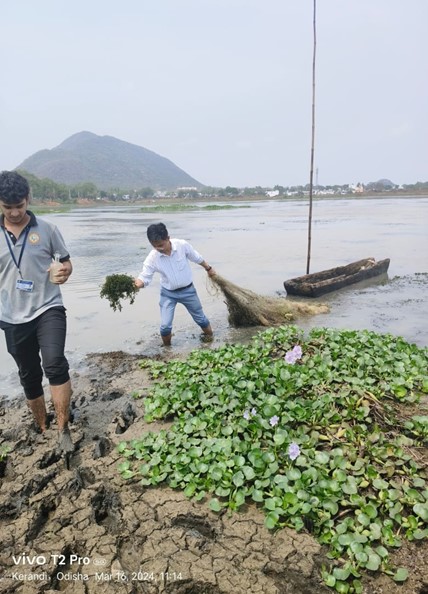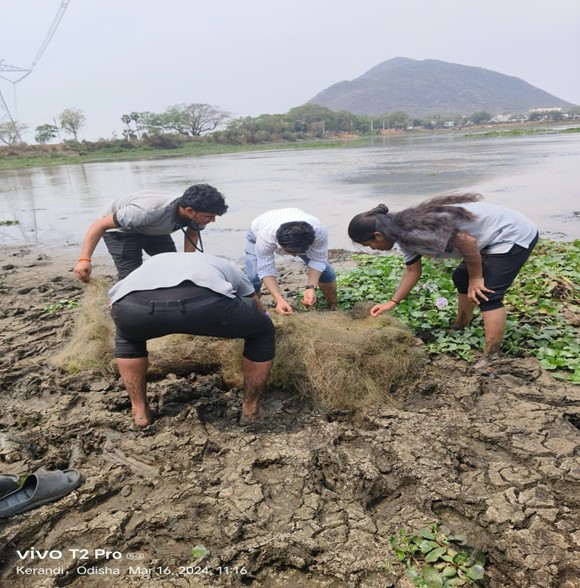Preserving Aquatic Ecosystems Through Community Collaboration
Through its School of Fisheries, Centurion University actively partners with local communities to restore and preserve shared aquatic ecosystems. This collaboration is demonstrated through a variety of initiatives and programs carried out in cooperation with neighboring communities.
The students have been working closely with fishing communities, SHGs (Self-Help Groups), and local panchayat members to support their development. Their activities include:
- Weed Clearing in Community Ponds:
As part of their cleanliness programs, the students assisted the locals in clearing weed-choked ponds, improving water quality and accessibility. - Regular Monitoring of Ponds:
In collaboration with the villagers, students collect soil and water samples from community ponds, which are then analyzed at the School of Fisheries’ aquaculture laboratory. Weekly samples are tested for key fish production parameters such as Dissolved Oxygen, Ammonia, pH, Temperature, Hardness, and Alkalinity. Based on the findings, appropriate pond management strategies are recommended. - Pond Management:
Local fish farmers regularly visit the university to seek advice from faculty on issues they encounter during the fish rearing process in their ponds. - Disease Surveillance:
Students routinely collect fish, water, and soil samples from Rasur Lake for analysis in the pathology laboratory. The tests have identified various bacterial organisms, though their levels remain within acceptable limits.
Collaborative Efforts to Sustain Rasur Lake’s Aquatic Ecosystem
On February 23, 2023, the School of Fisheries at Centurion University led a collaborative initiative with the local community through the Rasur Lake Ranching Program. This program, held at Rasur Lake, aimed to enhance sustainable fish population management in shared natural water bodies. Participants were introduced to lake ranching techniques that support ecological balance by boosting fish stocks and fostering biodiversity.
Through this community-centered approach, local stakeholders learned about the benefits of sustainable practices that ensure a consistent fish supply, strengthen local biodiversity, and support the region’s ecological health. This program underscores Centurion University’s commitment to engaging the local community in maintaining shared aquatic ecosystems.


The Fish Breeding Program for Fisherfolk is conducted annually to provide training and demonstrations to local fish farmers. The program aims to promote seed production activities and ensure the availability of high-quality seeds for enhanced production levels. It also focuses on improving the economic status of fish farmers by promoting ornamental fish farming in small-scale (backyard) settings.
The program sees enthusiastic participation from local fish farmers each year. The following activities are carried out as part of the program:
- Breeding of Indian Major Carps (IMC) and Exotic Major Carps (EMC):
Carp brooders are collected from the wild and brought to the Fish Rearing Centre at the School of Fisheries, Centurion University. After acclimatizing the brooders, their maturity is monitored. During the demonstration, gonadotropic hormones are administered to induce spawning, and the brooders are transferred to the spawning pool in the Circular Carp Hatchery. The eggs are then shifted to the hatching pool, and the spawns are observed by the fisherfolk the following day, after which they are transferred to the nursery rearing system. The same process is followed for other carp species and demonstrated to the fisherfolk, along with students. - Breeding of Commercially Important Ornamental Fishes:
Commercially important ornamental fish brooders are procured from the ornamental fish market in Kolkata and acclimatized at the Ornamental Fish Laboratory at the School of Fisheries. The setup and identification features of the species are explained and demonstrated to the fisherfolk, along with students. The breeding of popular ornamental fish species like Goldfish is demonstrated, and information about other ornamental species such as Angel Fish, Gouramies, Live Bearers, and Cichlids is also shared during the program.
Policy on Preventing Marine Pollution, Objective 5:
Fostering the cooperation and partnerships with the local neighbourhood:
Addressing land based pollution issues by collaborating with neighbouring villagers and local organisations can lead to coordinated efforts in combating land-based pollution sources and achieving sustainable development goals.
Implementation:
- Collaborative decision making and implementation of framework to mitigate all types of land based pollution.
- Collaborative cleanliness drives in common places like market, river site, drainage and canal to control the flow of litter into the ocean.
Link: https://cutm.ac.in/wp-content/uploads/2024/11/Policy-on-Preventing-Marine-Pollution-1.pdf
